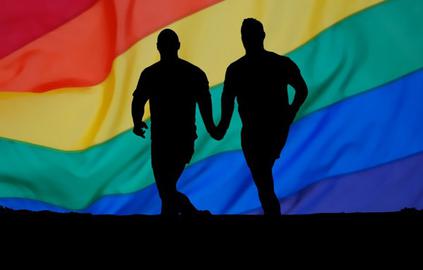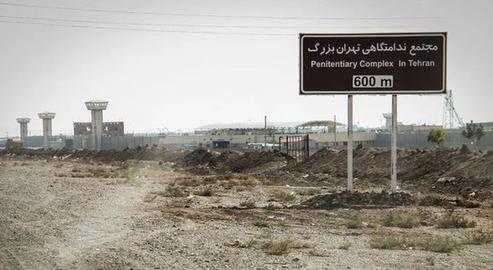"I am afraid of people, of the people of this city, of their behavior, of their nasty looks and their ridicule, of their sarcasm and irony. Because of my different appearance and behavior, everyone thinks I am trans, but I do not identify myself as trans. It is a terrible feeling that I am not able to defend myself against the violence of people in society and I am forced to remain silent. I thought it would be a little easier once I got out of the school environment, but as I go on, things get harder. I cannot share my problems with my family, because they do not understand me. They just want me to be the man they expect me to be. Sometimes things get so tough for me that I lock myself in the house for days and am afraid to go out. I do not know what excuse to tell my family when I stay at home and away from the community. Life is very scary for me, too scary."
Karen is a 20-year-old gay man living in Mianeh city near Tabriz in the province of East Azerbaijan. He is studying psychology, but says he feels he should see a psychologist or counselor himself because of his mental health and emotional stated. But in the small and closed environment in which he lives, it is not possible to find a psychologist with an open mind and sufficient information about the LGBTQ community. "In our city, there is no suitable psychology or counseling center for people like me, so I have not yet talked to a professional about my sexual orientation. I only have one close friend who understands me. I talk to him sometimes.
"I have a very traditional and religious family and I could never talk to them about who I am. There is no space to share my problems with my family. I'm afraid of my brothers. I do not know what they would do if they knew about my sexual orientation, but I know they would behave badly."
In Iran, discussion of people’s sexual and emotional inclinations is still largely a taboo subject. Though at one time homosexuality was regarded as a “mental illness” around the world, the American Psychiatric Association and the World Health Organization have not classified it as such since 1974 and 1992 respectively, a decision based on research conducted by social and behavioral scientists and psychologists around the world and in line with human rights conventions. Today, the diversity of sexual orientations in individuals is recognized as a fact.
"When I was in my first year of high school, I fell deeply in love with a boy for the first time," Karen says. "It was new and strange for me too. I never had the courage to say it, but I tried to keep that feeling in my heart at all times. After finishing high school, when I went to university, all my preoccupations were about scholarships and leaving the country, but I couldn't. Destiny made it so that I crossed paths with the person I loved again at university; my love for him was rekindled. But again I could not express my feelings to him, because I was afraid of not being accepted. I am afraid of being rejected."
For many people, the family represents a very important tight-knit community and a safe place for an individual. But often this is not the case for people from the LGBTQ community. They in particular need support from family because of all the societal and emotional pressures they face, and because they are often marginalized. But unfortunately, families often pose a major problem due to their ignorance and lack of accurate information about sexual and gender issues. Many people in the LGBTQ community are excluded from their families just because they are different, and because their families regard being from the LGBTQ community as a disgrace. They are often subjected to physical and psychological violence from family members, and in some extreme cases, they are even murdered.
"My brothers always have problems with my appearance and clothes,” Karen says. “Even though I do not look strange at all and I do not wear any special clothes, I am constantly criticized: why are my pants tight? What is that hat? They say a boy should wear loose men's clothes, a boy should not wear brightly-colored clothes. I have tried many times to explain that this is my style of dress and I have the right to choose, but they do not understand at all and constantly try to impose their opinions on me. They keep saying: 'you are a boy and you should behave like a boy.' Like other boys, they say, I should look for a masculine job like a mechanic, learn a masculine craft. Even from the point of view of my family, the university I study at is for girls' fields; I do not know who has set these gender stereotypes for us that makes life unbearable for someone like me."
Although he has been successful in all his studies, Karen says his family has always insisted on sending him to jobs that they consider to be for men. "I don’t know, maybe they think this can change my moral character. Otherwise, I have not told them anything about my sexual orientation. I remember when I was 15 or 16, the three months of summer holidays were always a torment for me. Every day when I opened my eyes in the morning, I had to face pressures from my family, pressures that I could no longer withstand. I was saying to myself, what am I guilty of? What sin have I committed that I should be a victim of violence? Why can I not live my life the way I want to and pursue my interests? But I never found the answer."
Statistics show that members of the LGBTQ community are exposed to higher levels of psychological trauma than people outside these communities. This includes depression, anxiety and stress. There is also a high suicide rate among LGBTQ people. Families can play a vital role in supporting them and creating a safer, healthier environment for them. Often what they need is understanding, acceptance, and support, and that is often what they are denied outright.
visit the accountability section
In this section of Iran Wire, you can contact the officials and launch your campaign for various problems

























comments